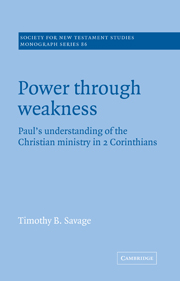Book contents
- Frontmatter
- Contents
- Preface
- List of abbreviations
- Introduction
- PART I POWER THROUGH WEAKNESS: THE BACKGROUND
- 1 The social setting of first-century Corinth: an historical examination
- 2 The situation in the Corinthian church: a biblical analysis
- PART II POWER THROUGH WEAKNESS: THE MEANING
- Conclusion
- Appendix
- Select bibliography
- Index of passages cited
- Author index
- Index of names and subjects
2 - The situation in the Corinthian church: a biblical analysis
Published online by Cambridge University Press: 20 August 2009
- Frontmatter
- Contents
- Preface
- List of abbreviations
- Introduction
- PART I POWER THROUGH WEAKNESS: THE BACKGROUND
- 1 The social setting of first-century Corinth: an historical examination
- 2 The situation in the Corinthian church: a biblical analysis
- PART II POWER THROUGH WEAKNESS: THE MEANING
- Conclusion
- Appendix
- Select bibliography
- Index of passages cited
- Author index
- Index of names and subjects
Summary
We discovered at the outset of our study that the Corinthians are critical of Paul in at least four important respects. They are dismayed by his reticence to boast, by his unimpressive physical appearance, by his inferior speech and by his refusal to take support. We must now ask whether our insights into the culture of first-century Corinth shed any light on these criticisms. But before we do we must gain a more precise understanding of the nature of the criticisms themselves – that is, we must examine carefully what Paul himself reveals about them in the text. Only then will we be able to appreciate how far the criticisms have been prompted by the culture.
Boasting
There can be little doubt that boasting was a matter of great importance in the Corinthian church. The sheer quantity of κανχ)-words in 1 and 2 Corinthians alone would suggest that Paul is writing to people for whom boasting is a prized activity. Of special interest is the phrase κανχãσθαι δεĩ. It occurs twice in 2 Corinthians (11:30; 12:1) and may well represent a slogan circulating within the church. If so, it confirms our suspicion about Paul's young converts: they are avid exponents of boasting and naturally critical of their apostle's refusal to boast.
What kind of boasting do the Corinthians value? Perhaps the best way to answer this question is to examine the behaviour of Paul's opponents, for it is especially their boasting that the Corinthians find so attractive (cf. 11:18–19).
- Type
- Chapter
- Information
- Power through WeaknessPaul's Understanding of the Christian Ministry in 2 Corinthians, pp. 54 - 100Publisher: Cambridge University PressPrint publication year: 1995

